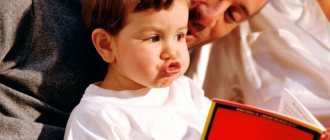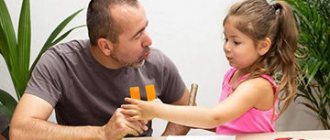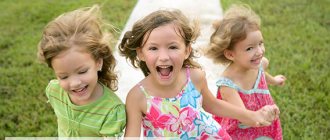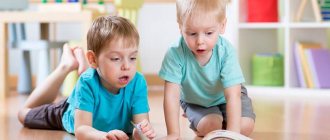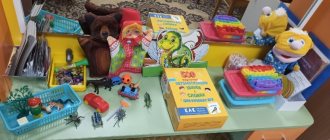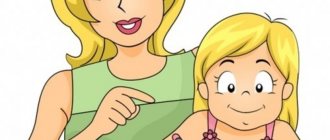Children's poems for speech development. Every child develops and becomes familiar with the world around him through speech. From the age of one month, babies begin to prepare to pronounce sounds. At the initial stage, they demonstrate this by humming, the next step is already accompanied by the pronunciation of syllables. When a child clearly learns to speak syllables, he will try to put them into words. After this, children develop the skills to connect words in the form of phrases and sentences. Your baby's ability to speak develops through reading and learning nursery rhymes. Rhyme helps children understand poems more easily and remember them better.
Speech development in preschool children: lecture
Contents of the lecture
- Tasks of speech development and education of preschool children
- Child speech development from birth to school
- Child speech development from birth from 0 to 6 months
- Child speech development from birth from 6 months to 1 year
- Child speech development at 1 year
- Child speech development at 2 years old
- Child speech development at 3 years old
- Speech development of a child aged 4–5 years
- Speech development of a child aged 5–6 years
- Speech development of a child aged 6-7 years
Download lecture
You can download the lecture “Speech Development in Preschool Children” HERE
Assignment for students
- Study the contents of the lecture “Speech development of a preschool child”
- Fill out the table in your notebook and submit it for verification:
Table: Speech development of a preschool child
| Child's age | Speech standards: what you should be able to do | Speech development techniques |
For a child aged 2 years
Children's poems for speech development. From the age of 2, children can read speech therapy poems. They are excellent at training the pronunciation of certain sounds and reinforcing clearly defined letters and syllables. 2 years is the right age to teach a child such rhymes.
Cat - midge
A cat sat on the window
The cat wants to eat a midge
Cat grabs a midge with its paw
Where is the midge? Not to be seen.
Heap - cloud
The wind from the sea drives the cloud
We rake the leaves into a pile
Rain cloud in the sky
The pile of garbage is large.
Pechka - river
The owner lit the stove
The little frog jumped into the river
Coal flared up in the stove
The frogs have a house in the river.
Funny speech therapy poems for children
Whims
We'll collect all Oksanka's whims in a big sleigh, We'll take them to a distant forest, Farther than the sea, farther than the mountains! And we’ll leave them near the Christmas tree... Let the evil wolves eat them!
***
If in our kitchen they cry for a long, long time, the toads begin to croak loudly in our kitchen, the water lilies will bloom, the sedge will rustle, and you will have to build a high bridge in the kitchen. Come across the bridge. Dear guests. Bring us handkerchiefs. Clean, dry.
***
It's dark at night Fish, fish, where do you sleep? A fox trail leads to a hole. A dog trail leads to a kennel. Belkin's trail leads to the hollow Myshkin to the hole in the floor It's a pity that in the river there are no traces of you anywhere Only darkness, only silence Fish, fish, where are you sleeping?
***
For a child aged 3 years
Children from three years old are suitable for poems that are easy to understand by ear and quite understandable. They must teach the child to correctly pronounce sounds that the baby does not yet know how to pronounce. After reading one poem to their child, parents can ask questions about what they read. The child must accept what this poem is about and draw certain conclusions. At their leisure, close family members of the baby can independently compose short quatrains and conduct activities with him.
An example of rhymes for speech development for children aged 3 years.
Airplane
The plane is flying,
The plane hums: “Oooh!”
I'm flying, flying, flying!
I’ll fly wherever I want!”
Should your child be vaccinated: read our article HERE
Vegetables
Listen to the story, don't be bored
Yes, notice mistakes.
Grandson loves vegetables:
Pear, apple, onion
And carrots and lemon -
He is friends with vegetables.
Hedgehogs laugh
The groove has two boogers
They sell pins to hedgehogs. You can't help but laugh! Everyone can’t stop: “Oh, you stupid boogers!” We don’t need pins: We ourselves are studded with pins.”
The meaning and role of poems in the development of diction
There are many exercises and techniques for training diction. The most interesting among them is the reading of poems - both special and classical versions.
The peculiarity of this “poetic” method is its simplicity: it is suitable for both children and adults. The poems have a rhythm that helps you control your breathing, place emphasis on certain words, and learn to observe intonation pauses.
A poem to improve diction is a kind of tongue twister, framed in a rhymed form. This allows you to pay attention to those sounds that cause difficulties in pronunciation (“r”, “sh”, “s”).
A certain “singing” form of poems makes it possible to emphasize vowel sounds, which regulate the correct pronunciation of words and intonation, which plays a decisive role in the development of diction
The task of any technique (and poems, in particular) is the correct presentation of speech.
Thanks to this, a person will be able to clearly express his thoughts, make the necessary impression on his interlocutor, and prove himself in professions where communication skills are important.
For a child aged 4 years
Children's poems for speech development. Children aged 4 years really like to listen to rhymes that contain animals, birds, insects, and seasons. They can be cheerful and sad, funny and instructive. All works are sure to evoke certain feelings in the child: joy, compassion, pity. Often, after reading a poem about those who are in trouble or trouble, children feel responsible for them and want to help them. Of course, relevant topics in poems for their age are the seasons, animals, everyday objects and things.
Winter
We ask mom for a fur coat - So autumn has returned to us. We'll walk in fur coats and collect mushrooms. I'll pick a bouquet of daisies and weave a wreath myself. Admire the daisies, Our winter is winter. The following poem trains the pronunciation of the letters: “r” and “l”.
“HOW TO STRENGTHEN A CHILD’S IMMUNITY” read HERE
Anthill
In an anthill under a willow, ants live beautifully. Their house is a fairy-tale palace, Every resident in it is a fighter. From childhood they learn to shoot, to protect the queen - mother. But the queen does not spin; she lays white eggs. Ants protect their royal eggs. And they live in a happy country In a palace under an old willow tree. You can invite your child to memorize and repeat this poem.
Boots
Dressed up the legs in new boots. You walk, legs, straight along the path. You walk, stomp, don’t splash through puddles, don’t walk into the mud, don’t tear your boots.
A fun song for speech development with movements
For a child aged 5 years
Parents should know that their little one at the age of five will not focus his interest on any one object. On this basis, when choosing poems, you should focus on works that use things that are understandable to a child. If you need to learn a poem, it should be short and simple.
Where is whose house?
The sparrow lives under the roof, In a warm hole there is a mouse's house. The frog has a house in the pond. A bird's house - a warbler - in the garden. - Hey chicken, where is your house? He is under his mother's wing.
Physical exercises in kindergarten
Horse
I climbed onto the horse and hold on with my hands. Look at me. I went to my mother.
cat house
Ding-dong, ding-dong, The cat's house caught fire. A chicken is running with a bucket, But she didn't get there, She spilled the water.
For a child aged 6 years
Children's poems for speech development. One of the main aspects for a baby is his family. Poems on this topic are very suitable for children aged six. Thanks to these works, the child understands and realizes that it is most correct to value and love in life, and learn to set priorities correctly. Preschoolers will be pleased to read a warm and touching work to their close family members.
Dad
Dad reads books to me. I value my friendship with him. I’ll retell each fairy tale out loud for Dad. I’ll retell it out loud. Then I’ll take the book. I’ll read it aloud to dad. Dad will retell the story. It will take my breath away. That’s how we read to each other. We retell it out loud. And it’s so fun in the apartment. And it’s so fabulous all around.
How to properly develop a child physically while he is small?
Children at this age will be no less interested in riddles about family members.
Who will teach us how to hammer a nail, not as a joke, but seriously? Who will teach you to be brave? If you fall off your bike, don’t whine, And scratch your knee, and don’t cry? Of course... (Dad)
He will always treat you with jam, he will set the table with treats, Lada is our sweetheart, Who? - Dear... (grandmother)
A very relevant topic for children aged six is saying goodbye to kindergarten.
Goodbye, kindergarten!
The kindergarten gave us a lot of knowledge and skills into the world of discoveries, adventures and success! And now we are invited to visit the school - 1st grade! Let learning give you joy every day and every hour!
How to prepare a child for school? What to do? How to practice?
Poems for diction
- A bug fell into Cheburashka's cup, Good Cheburashka took out the bug, put the bug on a piece of paper to dry. The bug dried up, rose from the piece of paper, and again fell into Cheburashka's cup.
- The blue moonlight did not let the donkey sleep, The donkey sat down on a boulder And yawned and yawned... And by chance the donkey suddenly swallowed the moon, Smiled, sighed - And fell asleep calmly.
- Evil rats Gnawed the roof, But a red kitten came, the rats ran into the holes and trembled there with fear. Khryusha - a piglet Oinks in his sleep: Oink and oink! Oink yes grunt! Give me the apricots! Piggy Pig, Before you eat, take some soap and wash your snout!
- Ten little chickens wandered into our kindergarten. They were brought in from the street by the Mottled Chicken. Dear chicken, you are on the wrong street, this is a kindergarten. But not for chickens!
- Sy-zy, sy-zy, it became boring without a goat. Se - ze, se - ze, I picked grass for the goat. Ri-li, ri-li, the cranes have arrived. Sha-zha, sha-zha, we found a hedgehog in the grass. Shche-zha, shche-zha, dirt on the bear’s shoulder. Zhi-shi, zhi-shi, they are as good as candy. Zu-su, zu-su, they don’t let a fox into the house. La-ra, la-ra, there is a mountain on a mountain. Pu-bu, pu-bu, an owl sits on an oak tree. Pa-ba, pa-ba, and under the oak tree there is a hut. Hey, hey, hey, chicken legs by the hut. No, no, no, that hut is coming to you. You, you, you, I found your traces. Those are the same, those are the same, but you are nowhere to be found. Tu-doo, tut-doo, and I go with a pipe. Ti-di, ti-di, come quickly.
- We can’t understand Dasha in any way, After all, Dasha has porridge in her mouth. But not buckwheat and not pilaf - This porridge is made of words!
- The letter “R” loves the tiger cub - He has been growling it since childhood. The letter “R” loves fish - Best of all... he is silent.
- Our little pig grunts loudly from the cradle on the letter “R”. I will be close friends with him - “R” will help me teach.
- I’m already skipping to my lessons with the speech therapist: After all, I can show my tongue to a strict teacher!
- Every officer must speak “R” perfectly! After all, otherwise he will not be a soldier in an even line. (Commands: “Attention!”, “Align!”, “Line up!”, “Pay off in order!”)
- It doesn't suit a deputy or a singer to be burry. Don’t give bread to parodists, learn to speak purely.
- We sat down in order, doing exercises together, not with our feet, not with our hands, but with our... tongues.
- Yesterday's hail damaged the grapes.
- Seryozhka cuts radishes into okroshka.
- And Marina’s gift included three huge tangerines.
- Tiger and lynx are relatives for pussy, Turnips and radishes are for radishes.
- Arthur in the portrait Wearing a burgundy beret.
- The rat has cheese rinds in his hole.
- Thirty-three huge crayfish, All in elegant red tailcoats.
- Spring rye is a grain crop.
- Princess Arina has three feather beds on her bed.
- We congratulated Ira on the radio.
- Cigarettes and cigarettes are all prohibited for the guys.
- Ice hole in the pond - I’ll come to fish.
- Our Borka dove with a beaver, but Romka dove with an axe.
- The driver is turning the steering wheel early in the morning.
- Curly redhead Yura is proud of his hair.
- Radio designer Invented a loudspeaker.
- A warm appeal to the people: Take care of your native nature!
- We will come to the holiday dressed up, neat and tidy.
- Crosswords and charades We are happy to solve them.
- I am happy to correct my speech apparatus.
- Arthur bought a tour to Europe.
- Prokhor and Varvara are a wonderful couple.
- The cook at the tavern guaranteed pasta for Ira’s side dish.
- And in the hands of the children are multi-colored balls.
- Star Raven repertoire: In the morning, in the evening - everything is CARRR!
- In our lake, Andrey Thirty caught eels. Fry, smoke them and boil them - Very tasty eels.
- To get the kernel from a nut, you need to crack through its shell.
- The beaver gnaws birch trees with its teeth, as if with sharp incisors.
- Sveta saw pineapples on a pine tree in a dream.
- The pussy asks Sasha: “Share the sausage!”
- The goose took a bath, but remained dry.
- In the garden, among the branches, a nightingale whistles.
- I tried, I tried - I signed for the parcel.
- The last leaf has fallen from the autumn aspen.
- The owl is observing the hourly routine, everything is on schedule, as agreed. (According to A. Usachev)
- Lenka treats Kolka’s sick knee with a green peg.
- I made Malvina's poodle from clay.
- I divide the orange into slices for Alina and for Kolka.
Storm from the shore
Tossed over, overturned The white-whiskered eels got angry and went wild. Thrown down, thrown up, Unraveled and intertwined from dawn to dawn. Trembling snakes, squealing snakes, What kind of dance, what kind of fairy tale have you started in the darkness? With swirling mists splashing the path, you have closed and obscured all the fairways to the ground. Encircled by the darkness, the ships were tossed about, lost in the ocean, tossed about uncontrollably, Water snakes, fire snakes lured them into the abyss. How are you deceiving? Isn't it the swiftness of the bending and twisting of long elongated bodies? And aren’t you caressing the intoxicating caresses that lead you to an unknown limit with slowness?
For a child aged 7
Most children are older and study poems by many famous poets: Pushkin, Ershov, Marshak, Mikhalkov, Chukovsky and other authors. Poems for remembering months, days of the week, numbers and letters are very good for training your memory.
Months
Eternally following each other The months go in a circle: In January and February Snow lies all over the earth. In March and April the sound of drops can be heard. As the snow and ice melt, May will come to us with flowers, But in June and July it will become hot as in a saucepan. And in August and September we will reap the harvest. In October and November, the forest beast will fall asleep in a hole, and when December comes there will be a holiday - New Year! Let's buy a new calendar and January will come again.
The letter a
Without the letter A you cannot write mom, Without the letter A you cannot write dad. And many of the words that you hear, without the letter A, you also cannot write. Well, for example, the word drum, Or, say, hare and wild boar. That's why we need the letter A, That's why the letter A is important to us. It’s not for nothing that no matter what you say, She is in first place in the Alphabet.
Unit
Unit, unit - The number is thin, like a knitting needle. She is very slender, visible to everyone. She is the first to sing a song, she is always the first to dance, from this number every day we count down all our affairs. There is an excellent motto, children, that one is responsible for everything, the Musketeers honor it,
They are eager to fight for one.
Don't know what to cook for a children's party? Read our article “WHAT TO PREPARE FOR A CHILD’S BIRTHDAY”
Go, spring, go, red
Go, spring, Go, red! Bring a rye ear, a sheaf of oats, a big harvest to our land!
***
“There are three hens on the street...” They are fighting with a rooster, Three girls are looking through the window, They are looking and laughing.
***
The rain was pouring down in buckets. I opened the gate and saw a Stupid Snail in the middle of the yard. I tell her: “Look!” You’re getting wet in a puddle... - And she told me from the inside: - It’s outside! And inside me there is spring, It’s a wonderful day! - She answered me from a tight shell. I say: “There is darkness everywhere... You can’t escape the cold!” And she answered: “It’s nothing.” It's outside! And inside me there is comfort: Roses are blooming, Wonderful birds are singing And dragonflies are shining! “Well, sit with yourself!” I said with a smile And said goodbye to the funny Silly Snail... The rain stopped a long time ago. The sun is halfway around the world... And inside me it’s dark, cold and damp.
***
